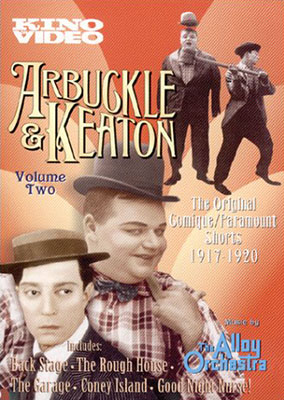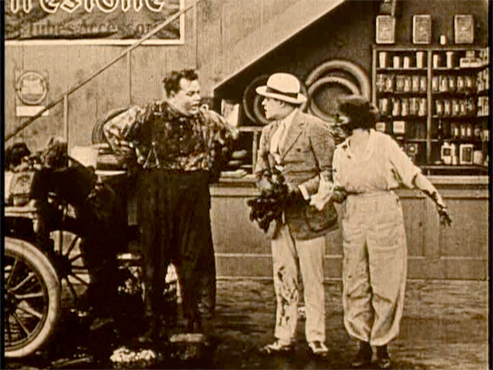
Reviews of silent film releases on home video.
Copyright © 1999-2025 by Carl Bennett
and the Silent Era Company.
All Rights Reserved. |
|
Arbuckle & Keaton
Volume Two
(1917-1920)
|
Contents: The Rough House (1917), Coney Island (1917), Good Night Nurse (1918), Back Stage (1919) and The Garage (1920).
Back Stage (1919) was once considered a lost film, but at least one clip appeared several years ago in David Gill and Kevin Brownlow’s documentary on Keaton, A Hard Act to Follow, indicating that the film has been available to be viewed for years. Roscoe and Buster (and a nearly nonexistent Al St. John) work as stagehands at a theater. An abusive strongman and his female assistant provide the villainous and romantic elements. When the acting troupe quits, the boys must go on with the show themselves. Roscoe and Buster’s brief on-stage dance is hilarious. Buster’s famous stunt from Steamboat Bill, Jr. (1928) is a direct descendent of the Back Stage gag that has a stage flat, painted as the side of a house, falling down around an untouched Roscoe.
The opening sequence of Good Night Nurse (1918) features a drunken Roscoe in a rainstorm (and that has to be Buster as the wind-blown woman with the umbrella!) simply attempting to light a cigarette. Meanwhile, his wife reads of an operation that cures alcholism and makes plans to check Roscoe in. Buster portrays the surgeon at the No Hope Sanitarium. Roscoe eventually dresses as a nurse to effect his escape. The flirting scene between Buster and Roscoe is quite funny, with Buster quite openly smiling on camera.
Coney Island (1917) is perhaps the best-known film is in this collection, and it begins with three shots that document Luna Park at night, with thousands of glowing light bulbs outlining the park’s buildings. While the film is a funny vehicle for Roscoe, the whole film is perhaps of greater value as a fantastic record of what the whole amusement park experience, and Luna Park in particular, was like in 1917. The ‘shooting the chutes’ gag is funny, as is the sight of Roscoe swimming like a whale. And Buster must do more whining and crying in this film than any other.
The Rough House (1917) was another Arbuckle/Keaton film that was believed lost for many years, but is now available for us all to enjoy again. The film is loosely structured around the premise that two dukes are coming to the Rough house for dinner. It is but an excuse for mayhem. This totally slapstick film should be shown in film studies classes as a prime example of silent era slapstick. Some gags verge on the homicidal. Is Roscoe actually getting ready to bite the nose of his wife when she begins throttling him?
In The Garage (1920), Roscoe and Buster work in a small-town garage, and double as town firemen. Keystone veteran Harry McCoy pops up in this latter-day film as Jim the village Casanova out to cajole the garage-owner’s daughter. And, is that a picture of Mabel Normand that Roscoe kisses before going to sleep?
— Carl Bennett
|
 Kino on Video Kino on Video
2001 DVD edition
Arbuckle & Keaton, Volume Two (1917-1920), black & white, 121 minutes total, not rated, including Back Stage (1919), black & white, ? minutes, not rated, Good Night Nurse (1918), black & white, ? minutes, not rated, Coney Island (1917), black & white, ? minutes, not rated, The Rough House (1917), black & white, ? minutes, not rated, and The Garage (1920), black & white, ? minutes, not rated.
Kino International, K205, UPC 7-38329-02052-1.
One single-sided, single-layered, Region 0 NTSC DVD disc; 1.33:1 aspect ratio picture in full-frame 4:3 (720 x 480 pixels) interlaced scan image encoded in SDR MPEG-2 format at 4.0 Mbps average video bit rate (capable of progressive scan upscaling to ? fps); Dolby Digital (AC3) 2.0 stereo sound encoded at 192 Kbps audio bit rate; English language intertitles, no subtitles; chapter stops; standard DVD keepcase; $29.95.
Release date: 10 April 2001.
Country of origin: USA
Ratings (1-10): video: 8 / audio: 7 / additional content: 8 / overall: 8.
|

The 2001 announcement of Kino International’s two-volume DVD collection of short films featuring Roscoe Arbuckle and Buster Keaton was a cause for excited anticipation. After all, the Kino editions of Buster Keaton’s films on DVD were, for the most part, great. Upon inspecting both volumes we can honestly say that their release is an occasion for celebration.
For years many of the Arbuckle films made for Keystone Film Company have been available in public-domain home video editions and are familiar to many silent film enthusiasts. But opportunities to view the Arbuckle Comique shorts and features have been difficult to come by, and the films have been nearly impossible to acquire on home video. We now have an opportunity to enjoy ten comedies between these two Kino DVD volumes that were made during Arbuckle’s mid-career phase (post-Keystone yet prior to his move into feature films) and at the beginning of Keaton’s film career. And, with the rumored demise of some of these films, it is pleasing that most of the films in this collection look so good.
A very good 35mm print was used for the video transfer of Back Stage (1919), with light speckling and dust, some exposure fluctuations, mild frame jitters, and some long vertical scuffing during the dance sequence. The transfer maintains the print’s even range of greytones and features generous image framing, but reveals in places what appears to be video-compression artifacts. A slow-motion, frame-by-frame inspection reveals that these aren’t artifacts so much as the combination of film grain, frame jitters, film speed and a range of greytone values that makes for difficult MPEG video compression. Most viewers will not notice, the majority of the video transfer is quite good.
The source material utilized for the transfer of Good Night Nurse (1918) is a very good 35mm print with a broad range of greytones and great image detail, and compromised slightly by some speckling and dust, and other light damage. As with several prints in the series, some brief sections of the film appear to be lost to print breaks or possible editing, such as when Roscoe falls through a set of French doors during his drunken dance.
The main title of Coney Island (1917) is not reconstructed digitally and utilizes the rerelease (or the original?) intertitles of the 35mm source print, which is is slightly rougher than others in this collection. Visible at times is a bit more speckling and a more print contrast, with some highly scuffed shots. In some sequences the shadow images are dark and closed up, such as the opening shots of Roscoe and the first police station sequence with Al St. John. In other shots, such as the Witching Waves sequence, the print is overexposed to a light grey overall. We believe it is likely that two or three prints of varying quality were utilized to compile as complete a reconstruction of the film as possible. The film is erroneously listed as released in 1918 on the DVD packaging.
The Rough House (1917) features a good but rough 35mm print, being speckled, worn and scratched. The film’s manic pace is emphasized by The Alloy Orchestra’s equally manic and catchy music score. Portions of some shots appear to be missing as some of the film’s continuity is choppy and disjointed, and the film ends abruptly. The film is erroneously listed as released in 1918 on the DVD packaging.
The Garage (1920) is another of the well-known Comique films, having been available for years on public-domain videotape. The opening moments of the film are disheartening because the film doesn’t look much better than those previously available tapes. Portions of the film appear to have survived only in contrasty 16mm reduction prints. However, the source print for this transfer has utilized just such a 16mm print and another good 35mm print to compile a fairly complete representation of the total film. A very good job has been done to present as much of the detailed 35mm footage as possible, even to the point of inserting a few seconds of higher-quality footage into a longer 16mm-based shot. Again, short sections of shots are missing, as action jumps forward over a break in the film. And, again, the film ends abruptly.
Buster’s athleticism is quite evident is several of the films in this collection, with his dance spins in Back Stage, his backflips in Coney Island, his amazing frontflip downhill as a cop in The Rough House.
Generally the 35mm prints utilized for the video transfers are in good to very good condition, with generally some light scuffing, scratches and speckling, some exposure fluctuations and frame jitters, but with well-defined visual detail. The transfers are generously framed and are transferred at proper running speeds. The grey values of the original prints and of the video transfer are broad, with occasional highlight detail burn out. Shadow values are open and well defined. Throughout the volume the transfers are color tinted in pale tones of yellow, blue and green, with some color-toned sequences. All main titles and intertitles appear to have been digitally reconstructed in authentic-looking borders and typefonts (with the noted exception of Coney Island).
The Alloy Orchestra has provided unorthodox music scores for the entire Kino Arbuckle-Keaton series, and all of the shorts include some punctuating sound effects that are well synchronized to the action. But the sound effects of the organ-grinder’s monkey in Good Night, Nurse! make it sound like a chicken. Sections of the scores to Coney Island and The Garage bring to mind the quirky CD releases of Muzic for Insomniaks by Devo’s Mark Mothersbaugh. And because quirky perhaps best describes the music here, we can confidently say that some viewers will dislike the music scores. However, we personally enjoy The Alloy Orchestra’s unusual approaches to silent film accompaniment and urge reticent viewers to give the DVD several spins before coming to a final judgment on the music.
While a few of the films collected here have previously been released on home video (mostly in substandard editions by public-domain companies), they have never looked this good. The films presented in this volume are noted in the DVD packaging as being licensed from Douris UK Limited, former holders of the Raymond Rohauer collection (now held by Cohen Media Group). The huge Rohauer collection contains many of the finest prints of the films of Buster Keaton, with many of the original 35mm prints coming from Buster’s personal collection. This Kino edition of Arbuckle-Keaton films, produced by Bret Wood, is definitely worth acquiring if you are a fan of Roscoe and Buster comedies. We highly recommend this DVD collection.
|
This Region 0 NTSC DVD edition has been discontinued
and is . . .
|

|
|




































